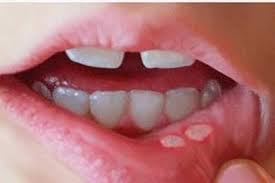The exact cause of most mouth ulcers is unknown. Stress or tissue injury is thought to be the cause of simple mouth ulcers. Certain foods, including citrus or acidic fruits and vegetables (such as lemons, oranges, pineapples, apples, figs, tomatoes and strawberries), can trigger a mouth ulcer or make the problem worse. Sometimes a sharp tooth surface or dental appliance, such as braces or ill-fitting dentures, might also trigger mouth ulcers.
Some cases of complex mouth ulcers are caused by an underlying health condition, such as an impaired immune system; nutritional problems, such as vitamin B12, zinc, folic acid, or iron deficiency; and gastrointestinal tract disease, such as coeliac disease and Crohn's disease.
When you first quit smoking, you may develop more mouth ulcers than normal, but this is temporary.
Some medications, including common painkillers, beta-blockers and some chest pain medications may cause a reaction that leads to mouth ulcers.



 Contact Us
Contact Us






 Hospitals
Hospitals
 Doctors
Doctors
 Diagnostic
Diagnostic
 Pharmacy
Pharmacy
 Health Tips
Health Tips
 Blog
Blog

























Comments